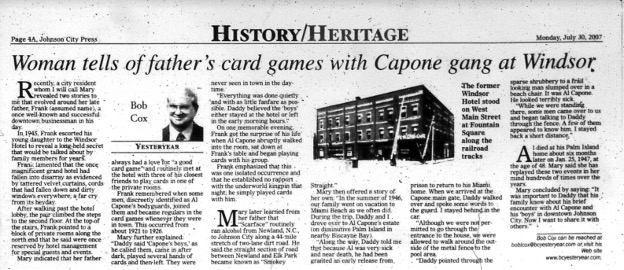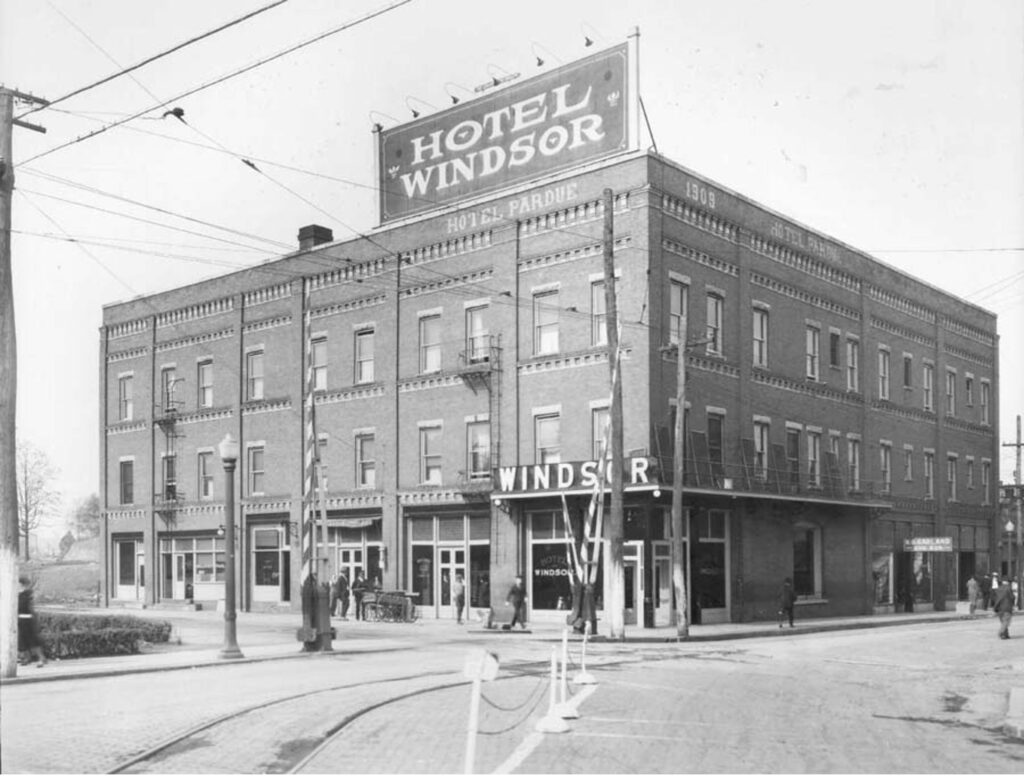Thanks to Library Assistant and Tennessee Room curator Zachary Harris for sharing some of Johnson City’s Little Chicago legends. In our “History Under the Blue Ridge” series, Zachary highlights intriguing stories found during his work in the Tennessee Room, your Library’s collection of local history and genealogy.
Johnson City exists in a nexus of three states: North Carolina, Virginia, and Kentucky. Because of its proximity to so many states, Johnson City was historically a railroad junction city. In fact, the city was so infamous as a railroad town that The Comet newspaper called its train depot the “ugliest on the line” in 1884.
During the city’s industrialization, railroads became integral to Johnson City’s development, and at its height our city boasted five railway operations. These rail lines brought economic prosperity and growth to the city.
However, when Tennessee began instituting Prohibition laws in 1838, another well-established industry also began taking advantage of Johnson City’s ever-growing rail connections.
Liquor bootlegging and smuggling were already established in our region prior to the advent of national railways. In fact, shining—the creation of untaxed illegal spirits—had patron saints in East Tennessee for generations beforehand, including the infamous Melungeon moonshiner Mahalia Mullins.

However, while hawking small-time liquor was not new in East Tennessee, the advent of railroads opened the door for more organized and profitable vices. By 1926, bootlegging was so widespread in the city that a Johnson City Staff News editor wrote that the average “church-going” citizen, after criticizing the police for failing to curb bootlegging, went home and took a “drink out of the private stock delivered to [them] the night before by [their] pet bootlegger.”
Illegal alcohol consumption was so rampant by the early 1900s that Johnson City gained the national title “Little Chicago,” becoming a younger sibling to Big Chicago’s vices and bootlegging.
Big Chicago-akin moonshining, smuggling, speakeasies, and underground liquor did exist in Little Chicago, but the most infamous legend about this era of the city remains its alleged connection to Al Capone’s crime syndicate.
Although there is little written record of Al Capone’s presence in Johnson City (since crime bosses don’t typically keep records of their whereabouts), oral history alleges his presence. In a 2007 Johnson City Press article, a resident claimed that her father played cards with Al Capone at the Windsor Hotel.

Using the reported tunnels under the city’s streets, it has been widely claimed that Capone not only frequented the Windsor, but also the Montrose Court Apartments and the John Sevier Hotel. Still, most of what we know about these visits remains hearsay.
Records of Little Chicago history also include some of the stranger, unintended effects of Prohibition. A 2003 article in The New Yorker reported that in the early 20th century Johnson City had a disproportionate presence of the “Jake Leg Plague.” People were coming down with a paralysis that caused leg muscle dysregulation. The “Jake Walk” referred to an often-lifelong spasm that made walking difficult, and often afflicted people after they consumed “Jake.” Jake, or Jamaican ginger beer, was a popular over-the-counter substitute for liquor during Prohibition. The mixture often contained a chemical found in lacquers, and it served as an intoxicator and neurotoxin.

While alcohol substitutes abounded in Johnson City, the real stuff still reportedly flowed underground. According to the owners of Mulligan’s Gaming Pub, their building—the Charles Building on East Main Street—once served as one of these underground bars. However, without written records, stories like this still serve as mere possibilities rather than fact.
If these tidbits from our city’s history piqued your interest, you can learn more about Little Chicago or the history of moonshining in our area at your Library. Our Tennessee Room contains physical resources for researching these eras, including books like Corn from a Jar: Moonshining in the Great Smoky Mountains and Mountain Spirits: A Chronicle of Corn Whiskey from King James’ Ulster Plantation to America’s Appalachians and the Moonshine Life.
Through the Library, you can also use the Tennessee Electronic Library in your Little Chicago research; you’ll find extensive archives of local historical newspapers, including the Johnson City Chronicle, the Johnson City Staff-News, and The Comet.
Your Library also keeps a folder of research aid for those interested in the legends of Little Chicago; it’s available upon request at the second-floor Information Desk.
More News





